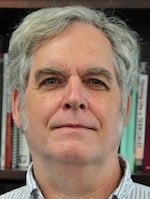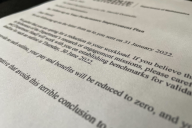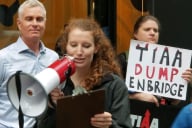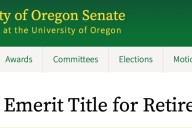You have /5 articles left.
Sign up for a free account or log in.

Philip Schrodt
Pennsylvania State University
Study after study shows that baby-boomer professors aren’t retiring. Between the hits their 401ks took during the recession and fears of stepping off into an intellectual abyss, many academics have both financial and personal interest in significantly delaying retirement or rejecting it altogether.
But Philip Schrodt says that if you’re honest, “You just know when it is time to quit.” And that’s what the former professor of political science at Pennsylvania State University has done, after 40 years in academe (and 31 years as a tenured professor). A day after receiving his last paycheck from Penn State, Schrodt took to his blog to explain why he decided to retire at 62.
The post, called “Going Feral! Or ‘So Long and Thanks for All the Fish,' ” (the latter part a reference to the Douglas Adams book The Hitchhiker's Guide to the Galaxy) is funny and biting in its critique of academe and professors of his generation who have lost their passion for their jobs but are hanging on to their paychecks. It’s also attracting lots of attention for its unorthodox take on tenure, at least from a tenured professor.
But first, Schrodt’s idea of retirement isn’t sitting around.
“On the contrary, I’m rather busy at the moment, and intend to remain so for the foreseeable future, even if I’m not entirely convinced of the assertion that one of my projects will be funded ‘in perpetuity,’ ” he wrote of his plan to become a consultant in semi-retirement. “Rather: ‘I’ve left to pursue other opportunities and get my fat Boomer butt out of the way.’
“Or as I prefer to think of it, ‘going feral.’”
Between technological innovations that will allow him to continue working at home; a growing boredom with trendy theories that seem, after a time, to pop up cyclically; and an understanding that a mix of new and old blood is vital to the success of academic departments, the time seemed right to retire, Schrodt said in an interview. But the biggest reason anyone should retire is hesitation at the question, “Do I enjoy what I’m doing?”
“I do not for a second question the decision to spend 40 years in this business, but it was getting to the point where I was not sure I wanted to be doing this anymore,” he said. “We all have our good days and our bad days, and I spent a year and a half thinking about this. But when the question comes up negative again and again, you have to start asking, 'What's next?'"
It’s something that more baby boomer professors should ask themselves, he said, calling the mass delayed retirement of professors who want to stop working but don’t for financial reasons a “very real problem.”
“It doesn’t apply to everybody out there, but there’s no department of a reasonable size at any institution in the country that doesn’t have a couple people like that, and it’s going to get worse,” he said.
After a certain point, he says, it’s simply someone else’s turn.
“I’m not unhappy with what I accomplished during those 40-odd years in academia — though I am prudently waiting at least a year before blogging a self-assessment of that — but for the most part, it’s done,” he wrote. “And frankly even some of those things I could continue doing, for example publishing in four-letter journals, I’d just be getting in the way — boomers, that’s you — of people who need those zero-sum resources more than I do. Like to get tenure.”
He continued: “I’d like to think I’m still doing research that is interesting, but once the work is written, it is out there on the web where anyone can find it, so why go through the agony of dumbing down the work for a major journal which will then hide it behind a paywall?” (One of Schrodt’s most influential articles, “Seven Deadly Sins of Contemporary Political Quantitative Analysis," has been publicly available online since he presented it to the American Political Science Association in 2010. Controversial in its criticism of the discipline's predominant methodology, the article is only now forthcoming in the Journal of Peace Research. Schrodt said he doubted whether it ever would have been published without first gaining a following outside the journal system.)
And much of that research becomes so irrelevant so quickly, Schrodt says. (He admitted that he had begun to fall behind on theory, when so much of it is published by “people who literally could be my grandchildren. …It’s just human nature.”)
“You start to recognize just how much of what seems trendy and oh-so-cool right now, whether theory or methodology, is utterly transient, with an expected lifespan approximating that of a gerbil, and on the theoretical side, often as not is merely a poorly updated re-hash of some school of thought current 3,000 or more years ago,” he wrote.
The political scientist also attributes part of his decision to retire now to Penn State, which he calls “phenomenally weird, following a North Korean governance model without the transparency” and an “authoritarian hellhole.” The Jerry Sandusky case didn’t help, he said. Schrodt began at Penn State in 2010, after 21 years as a professor at the University of Kansas.
Schrodt said his blog posts typically max out at several hundred views. In just a few days, “Going Feral” already had gotten 8,000 views and been shared numerous times on Facebook and other social media. The professor said he hasn’t gotten much negative feedback, but lots of positive feedback – especially from younger professors just starting their careers.
One fan, Kim Yi Dionne, a political scientist who just left a tenure-track position at Texas A&M University for one at Smith College, liked the post for its nuanced, strong opinions, she said in an e-mail.
“The primary reason is that he tells it like it is -- he is openly critical of a system in which he has been a part for most of his life,” she said. “Second, unlike many senior colleagues I've spoken to who work at R1 institutions, he sees opportunities for himself (and for others with similar training) outside of academia and has not ‘drunk the Kool-Aid’ that being an academic is the be-all and end-all.”
She continued: “Another reason I liked it: the man self-describes as being old and yet is embracing change -- a huge change at that! As a young academic who just recently made a leap, it feels a bit daunting. But if this guy can do it after decades of success in academia, it offers some hope.”
Pedro Dos Santos, an assistant professor political science at Luther College who was a graduate teaching assistant under Schrodt at Kansas, said he’s a regular reader of his “tell-it-like-it-is” blog.
“As a pre-tenured professor and as a political scientist, I think that posts like [Schrodt’s] are great to generate a debate that involves both ‘old-timers’ and newcomers on many issues involving the political science profession (such as methodological discussions), and academia as a whole,” Dos Santos said in an e-mail.
The post also resonated with Roland Stephen, a political scientist who recently stepped down from his tenured position at North Carolina State University after just 15 years, for a career as a consultant. He works at North Carolina State’s Institute for Emerging Issues.
Not a “true academic,” Stephen said he was interested in working outside the ivory tower – something more academics should consider earlier in their careers.
“This guy thinks it’s thrilling that he did something else,” he said of Schrodt’s plans to consult. “But how about doing something else before you retire?”
Most people are too tempted by the security of tenure, he said, something that has moved from being “a contractual agreement that protects [academic] freedom to being a contractual agreement that protects jobs.” No such agreement exists anywhere outside the academy, he added.
Schrodt also said tenure needed to be changed to fit the evolving nature of higher education and discourage employment that’s no longer benefiting the institution. One possible solution is long-term contracts, of five to 10 years, he said. Another is the reinstatement of a mandatory retirement age for those in higher education.
“If we had unlimited resources, we’d all stay on,” he said. “But you have to keep the balance there.”









